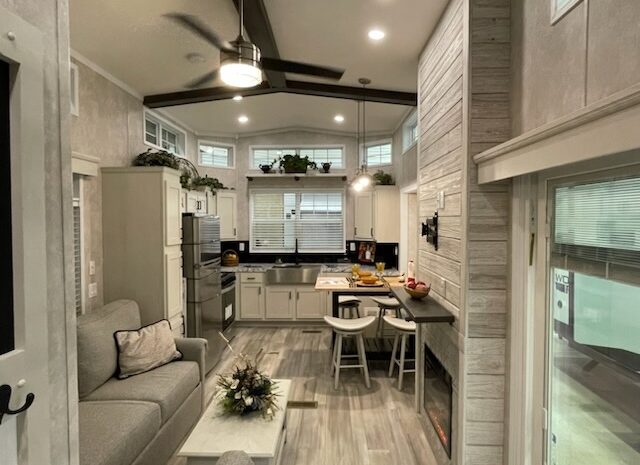The decision to buy a home is a significant one, often influenced by various factors such as budget, location, and personal preferences. One of the choices prospective homeowners face is whether to purchase a new construction home or an existing one. New construction homes offer several advantages but also come with certain drawbacks. This blog post will explore both sides of the coin to help you make an informed decision.
Pros of Buying New Construction Homes
- Customization Options
One of the most appealing aspects of new construction homes is the ability to customize. Buyers often have the opportunity to select floor plans, paint colors, flooring materials, and other design elements. This level of customization allows homeowners to create a space that perfectly fits their style and needs, something that’s often not possible with existing homes.
- Modern Amenities and Technology
New construction homes come equipped with the latest in home technology and modern amenities. From energy-efficient appliances and smart home systems to advanced heating and cooling systems, new homes are designed to be more efficient and convenient. This not only enhances the living experience but can also lead to significant savings on utility bills over time.
- Energy Efficiency
Builders of new homes are increasingly incorporating green building practices and materials, making these homes more energy-efficient than older ones. Features such as better insulation, energy-efficient windows, and modern HVAC systems reduce the overall energy consumption, which is not only better for the environment but also lowers monthly utility costs for homeowners.
- Lower Maintenance Costs
New homes are less likely to require immediate repairs and maintenance compared to older homes. Everything from the roof to the appliances is brand new, which means fewer worries about things breaking down or needing replacement. This can be a significant financial relief, especially in the first few years of homeownership.
- Builder Warranties
Most new construction homes come with builder warranties that cover various aspects of the home, such as structural components, roofing, and major systems. These warranties provide peace of mind to homeowners, knowing that if something goes wrong, it will be fixed at no additional cost.
- Community Amenities
New developments often include community amenities such as parks, playgrounds, swimming pools, and clubhouses. These features can enhance the quality of life and foster a sense of community among residents. In addition, new neighborhoods are typically designed with modern infrastructure, including better roads, sidewalks, and lighting.
Cons of Buying New Construction Homes
- Higher Costs
New construction homes tend to be more expensive than existing homes. The cost of customization, modern amenities, and the premium for new materials and labor contribute to higher prices. Additionally, there can be unexpected costs such as upgrades, landscaping, and homeowners’ association (HOA) fees that add to the overall expense.
- Construction Delays
Buying a new construction home often means dealing with construction timelines, which can be unpredictable. Delays due to weather, supply chain issues, or other unforeseen circumstances can push back the move-in date, causing inconvenience and potential financial strain if temporary housing arrangements are needed.
- Limited Negotiation Power
When buying an existing home, there is often room for negotiation on the price and other terms. However, with new construction, builders typically have set prices and may be less willing to negotiate. This can limit a buyer’s ability to get the best possible deal.
- Lack of Mature Landscaping
New construction homes usually come with minimal landscaping. It can take years for trees and shrubs to grow and for the neighborhood to develop a mature, established look. Homeowners may need to invest time and money into creating a desirable outdoor space.
- Potential for Construction Quality Issues

While new homes are generally built to modern standards, not all builders are created equal. There can be variability in the quality of workmanship and materials used. It’s crucial for buyers to research the builder’s reputation and inspect the home thoroughly before finalizing the purchase. If you enjoyed this article about house buying then visit Rethinking The Future for more interesting articles.
- Less Charm and Character
New homes may lack the charm and character of older homes. Historic homes often feature unique architectural details and craftsmanship that can’t be easily replicated in new construction. For buyers who value these characteristics, a new home might feel sterile or cookie-cutter in comparison.
- Developing Neighborhoods
New construction homes are often located in developing neighborhoods, which can be both a pro and a con. On the positive side, these areas might appreciate in value as the community grows. However, it also means that the area could be subject to ongoing construction for years, which can be noisy and disruptive.
- Environmental Impact
While new homes are more energy-efficient, the construction process itself can have a significant environmental impact. The development of new land often involves clearing natural habitats and increasing urban sprawl, which can contribute to environmental degradation.
Conclusion
The decision to buy a new construction home involves weighing the pros and cons based on individual preferences and circumstances. New construction homes offer modern amenities, customization options, and lower maintenance costs, making them an attractive option for many buyers. However, the higher costs, potential for construction delays, and the developing nature of new neighborhoods are important considerations.
Ultimately, whether a new construction home is the right choice depends on your priorities and long-term plans. It’s essential to do thorough research, visit multiple properties, and consider both the immediate benefits and future implications before making a decision. By understanding the advantages and drawbacks, you can make a more informed choice that aligns with your lifestyle and financial goals.

